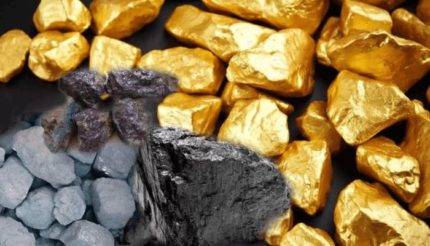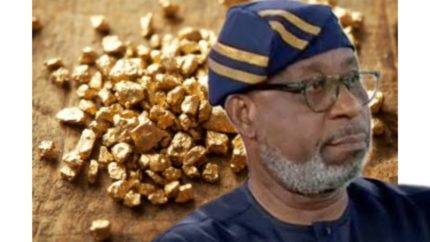The Federal Government, through the Ministry of Solid Minerals Development, has granted approval for approximately 499 licenses for the buying and selling of solid minerals in the year 2023. This announcement was made by the Minister of Solid Minerals Development, Dele Alake, during his keynote address at the BusinessDay Solid Mineral Conference held in Abuja on Tuesday.
The approval of these licenses marks a pivotal step in facilitating the growth and development of the solid minerals industry. Notably, a clear trend emerged from the data, revealing a substantial demand for lithium. Out of the total licenses granted, 146 were allocated for the trade of lithium, surpassing other minerals such as gold (91 licenses), tin (46), and coal (32). The comprehensive list also included licenses for tantalite, iron ore, kaolin, feldspar, beryl, barite, columbite, mica, and aquamarine, underscoring the diverse range of minerals being actively traded.
Strategic Plans for Nigerian Solid Minerals Corporation Unveiled
Minister Dele Alake also disclosed the Federal Government’s strategic plans for the Nigerian Solid Minerals Corporation, emphasizing a private-sector-driven approach. He revealed that the government aims to hold approximately 25% of the N1 billion share capital of the corporation, with 25% allocated to Nigerian citizens through public shares. Private investors, on the other hand, can acquire up to 10% of the remaining shares.

To solidify these plans, Alake highlighted the ongoing legislative process for the creation of the Nigerian Solid Mineral Corporation. The minister noted that the Solid Minerals Committee of the House of Representatives is scheduled to conduct the first policy dialogue on February 12 and 13, 2024, to discuss and deliberate on the proposed law for establishing the corporation. The envisioned share structure reflects a private sector-led strategy, ensuring that the Federal Government, Nigerian citizens, and private investors each have a defined stake in the N1 billion share capital. This move signifies a deliberate effort to balance public and private participation in the solid mineral sector, fostering sustainable growth and development.
A Historical Overview and the Urgent Need for Revitalization
In the pre-independence era, solid minerals played a pivotal role in propelling Nigeria’s economic development. Notably, coal emerged as a vital energy source for electricity and railways, garnering international recognition for its quality. Additionally, Nigeria boasted significant exports of Tin, Columbite, Lead, and Zinc, with the country holding the title of the largest producer of Columbite at one point. The revenue generated from these solid minerals fueled infrastructure projects, including the development of roads, education, and hospitals. Moreover, these funds played a crucial role in shaping the emerging petroleum industry, laying the foundation for Nigeria’s economic growth.
Decline, Neglect, and the Menace of Illegal Mining
However, the fortunes of Nigeria’s solid minerals industry took a nosedive with the discovery of oil. The newfound dependence on oil transformed Nigeria into a mono-product economy, rendering it susceptible to international oil politics. This dominance stifled attention to the global challenges facing the solid minerals sector. The subsequent neglect resulted in disorder within the minesfield, characterized by an influx of illegal miners. Their activities not only included inefficient mining practices but also the illegal trading of high-value minerals, leading to severe ecological degradation, the spread of diseases, and substantial revenue loss due to smuggling.

In light of these challenges, it is imperative for the government to address the issues plaguing the solid minerals industry in Nigeria. A proactive approach is necessary to unleash the sector’s potential and enable it to fulfill its role in the social and economic development of the nation. By mitigating illegal activities, implementing sustainable practices, and fostering international partnerships, Nigeria can revive its solid minerals industry, diversifying its economy and securing a more resilient future.
Unleashing Nigeria’s Economic Potential
Undoubtedly, the establishment and effective management of Nigeria’s solid minerals sub-sector must be actively explored key to catapulting Nigeria into a new era of economic prosperity, social advancement, and political stability. In a paradigm shift from the petroleum-centric focus, a thriving solid minerals industry promises to generate gainful employment opportunities on an unprecedented scale, significantly surpassing the contributions of the petroleum sector. This not only diversifies the employment landscape but also leads to a substantial rise in national income, ensuring a more resilient and diversified economic foundation.
Local Raw Materials, Rural Development, and National Unity
Beyond its economic impact, a flourishing solid minerals sub-sector is poised to provide a sustainable supply of local raw materials for industries, thereby reducing dependence on imported resources. This, in turn, will bolster industrialization, foster innovation, and contribute to the overall growth of the manufacturing sector. Crucially, the development of solid minerals has the potential to bring essential infrastructure and wealth to rural areas, addressing longstanding disparities and promoting inclusive growth. As these minerals are dispersed across all states of the Federation, their utilization becomes a unifying force, fostering a sense of national identity and cohesion. This strategic utilization could also alleviate tensions surrounding resource control, underscoring the importance of a collective approach to harnessing Nigeria’s vast mineral wealth.
However the latent potential of Nigeria’s solid minerals sub-sector must be actively explored and harnessed to usher in a new era of economic prosperity, social inclusivity, and political stability. This strategic shift not only promises to invigorate the nation’s economic landscape but also holds the key to fostering unity, reducing regional tensions, and positioning Nigeria as a formidable player on the global economic stage. It is imperative for the nation to awaken to this untapped resource and forge ahead with purposeful policies and investments that will unlock the full potential of its solid minerals sub-sector.
Table of Contents
Discover more from OGM News NG
Subscribe to get the latest posts sent to your email.














